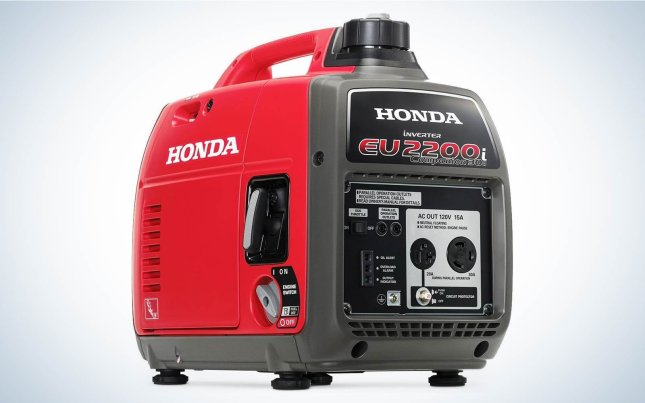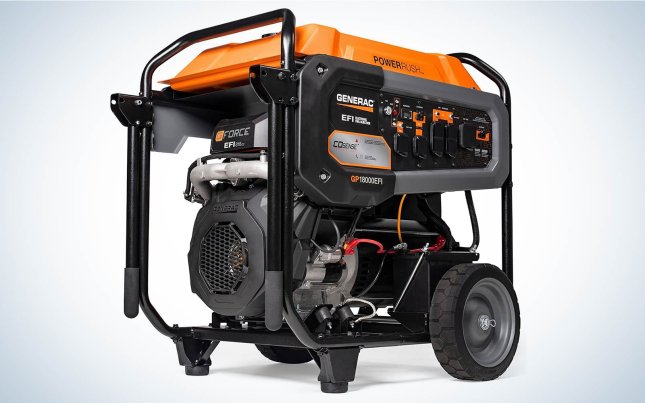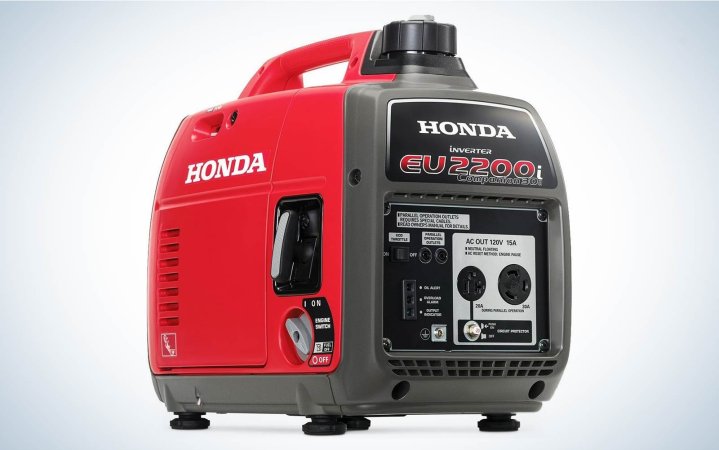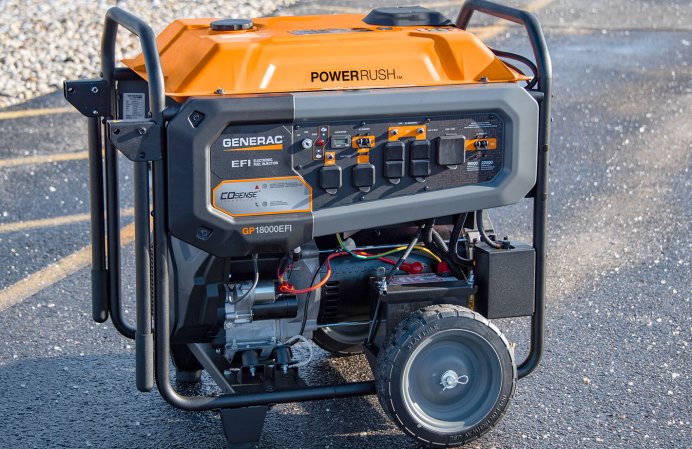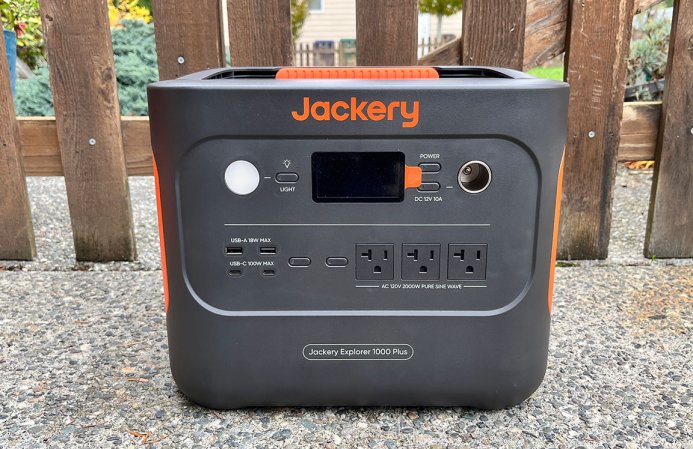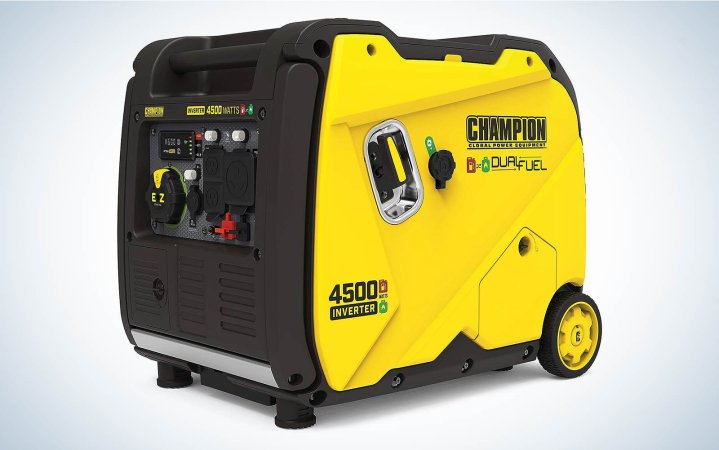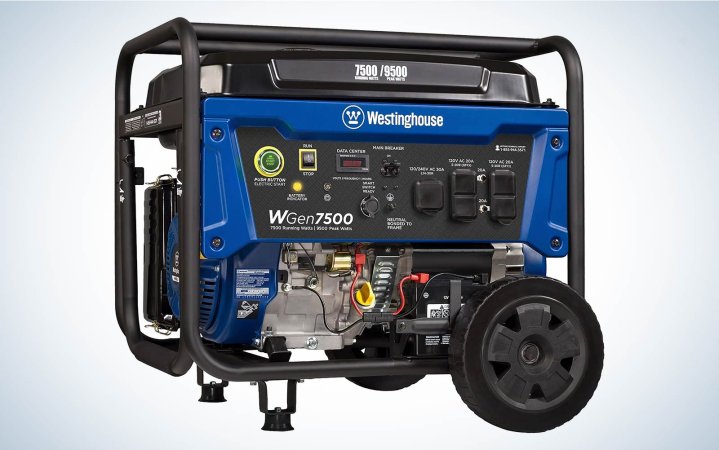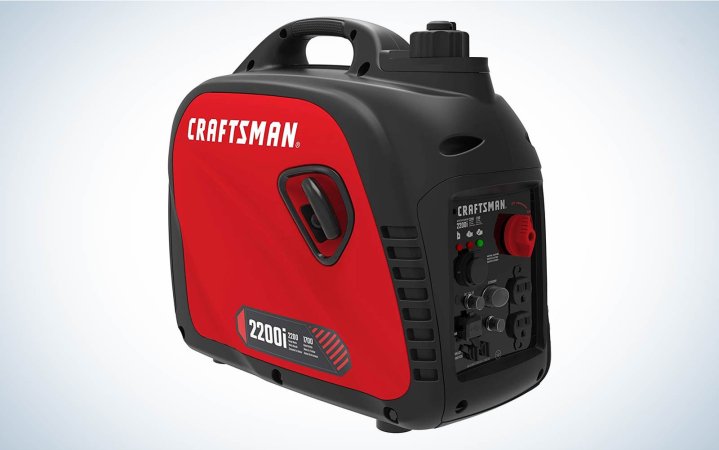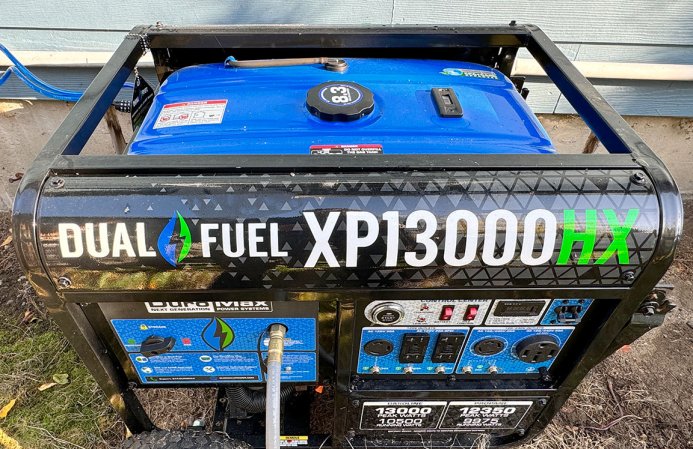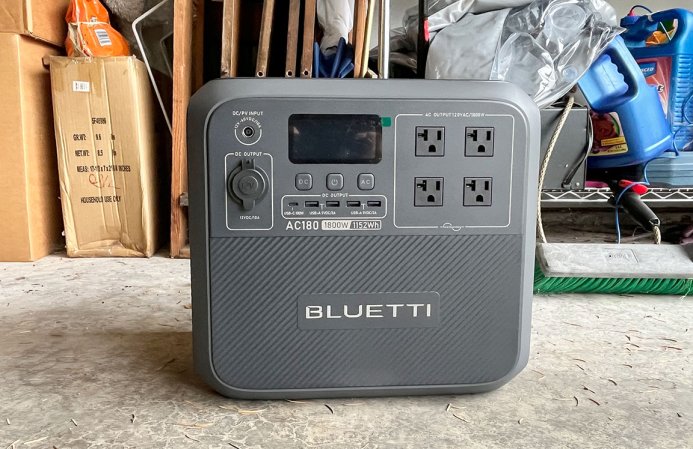We may earn revenue from the products available on this page and participate in affiliate programs. Learn more ›
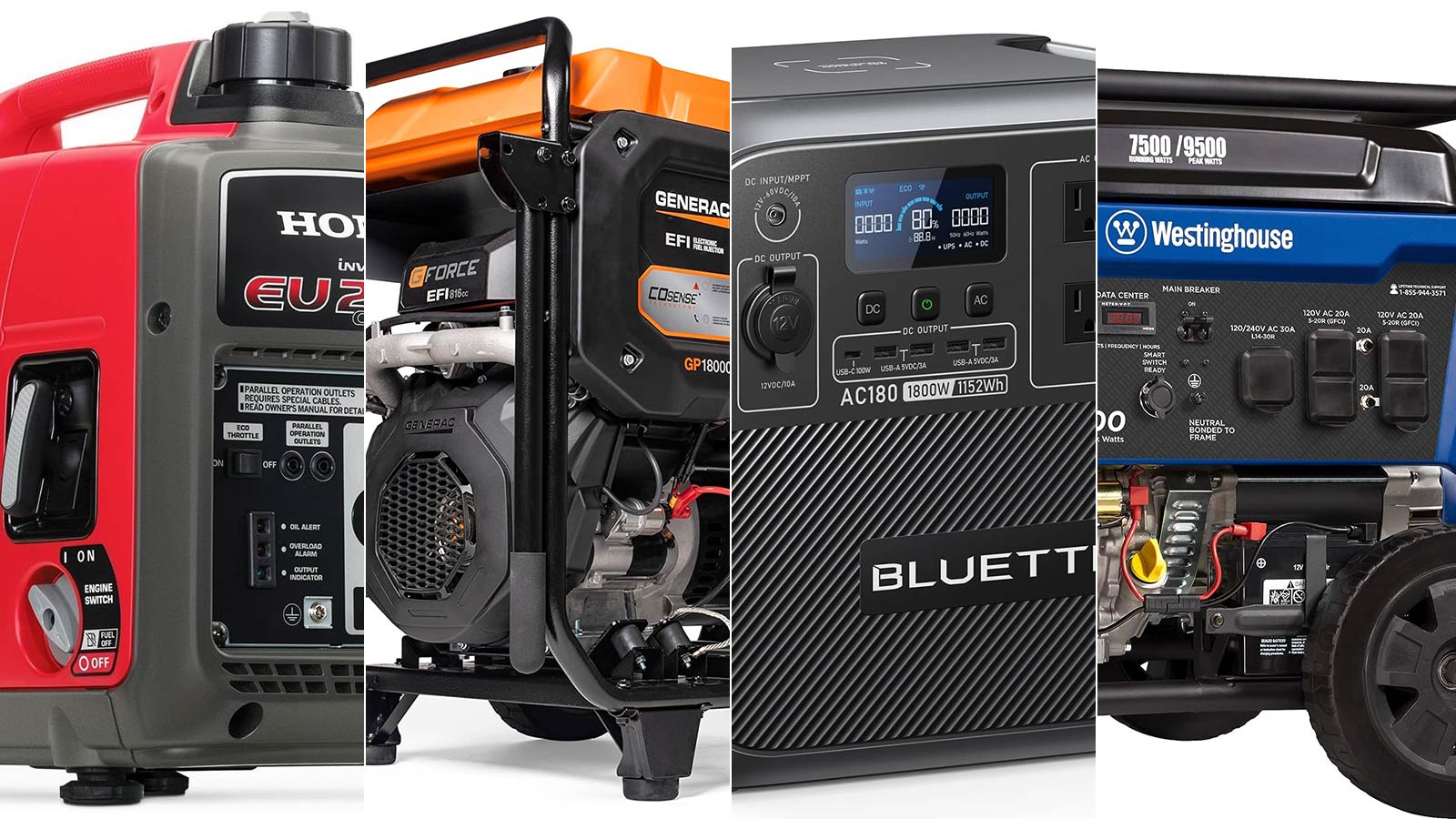
A portable generator is useful in a wide variety of situations. For camping, it can help keep your RV or van conversion fully juiced and your devices topped off. At home, it’s easy to move into place when the utility power goes out. It provides the electricity necessary to use power tools at off-grid worksites. And it’s generally essential whenever and wherever you need power but don’t have access to a plug. Portable generators come in various forms, ranging from very small portable power stations to exceptionally large (yet still mobile) gas generators. Whatever the case, the best portable generators are relatively easy to move, durable, and dependable, and we’ve tested a bunch of them to determine which are your top picks for various purposes.
- Best overall: Honda EU2200i Companion Portable Generator
- Best high capacity: Generac 7706 GP18000EFI Portable Generator
- Best solar: Jackery 1000 Plus Solar Generator
- Best for RVs: Champion Power Equipment 200988 4500 Watt Dual Fuel Portable Generator
- Best for home backup: Westinghouse 9500 Portable Generator
- Best budget: Craftsman C0010020 2,200 Watt Portable Generator
- Best dual fuel: DuroMax XP 13000HX Dual Fuel Portable Generator
- Most portable: Bluetti AC180 Portable Power Station
How we chose the best portable generators
I am what is commonly referred to as a “gear junkie” in that I am borderline obsessive about testing a wide range of tech tools, particularly those relevant to the outdoors and varying home DIY projects. Portable power generators not only rank among those tech tools in and of themselves but have also been essential to charging all the other electricity-hungry items like phones, the best MacBooks, the best travel drones, power tools, the best electric bikes, and my trusty van conversion, not to mention an RV or home when the lights go out. I’ve also written guides about the best solar generators and inverter generators for PopSci.
That being the case, I’ve had the opportunity to test out generators of every variety, and I’ve combined that experience with insight from other PopSci writers who have tried everything from small, straightforward power stations the size of a shoebox to big, feature-rich behemoths designed to power a small army. Accordingly, I know which generators provide plenty of juice and which fizzle out under a full power load. Armed with this knowledge, I have spent over a decade reviewing generators and other equipment for outlets like Popular Science, Popular Mechanics, the Daily Beast, Thrillist, and more. Occasionally, I’ve arrived at split decisions for certain categories, so to break the tie, I’ve looked to input from my fellow experts as well as reviews from real-world buyers.
The best portable generators: Reviews & Recommendations
The picks below span a range of sizes, intended uses, and budgets. Some are small and lightweight and designed for appropriately smaller power demands, while others are big on both size and output. All, however, are portable in some capacity, whether because they’re compact and easy to carry or equipped with mobility aids like wheels and handles.
Best overall: Honda EU2200i Companion Portable Generator
Why it made the cut: Super portable, durable, and intuitive to use, this is an outstandingly versatile, go-anywhere generator.
Specs
- Wattage: 2,200 peak/1,800 running
- Power source: Gas
- Weight: 46.5 pounds
- Price: $1,299
Pros
- Highly portable
- Rugged durability
- Very quiet
Cons
- Only moderate power output
It shouldn’t come as much of a surprise that Honda has topped our list. The company has been making outstanding generators for a long time, and the EU2200i is the perfect representation of how the brand manages to do a little bit of everything just right.
Compact, lightweight, and easy to carry thanks to its sturdy handle, this is about as portable as generators can get. While its 2,200W output isn’t exactly going to replace an electrical line, it’s still a solid amount to keep an RV air conditioner going, power the hungriest of power tools, or keep your fridge and a few other essentials going during a blackout. The 20- and 30-amp outlets allow you to use a typical AC plug or larger RV plug, and it’s equipped with an array of safety features to make sure nothing goes awry.
It’s also incredibly durable. I’ve hauled mine along through many camping trips, and I’m not exactly gentle with my outdoor gear. And thanks to its quiet operation, you can enjoy electrification in peace.
Best high-capacity: Generac 7706 GP18000EFI Portable Generator
Generac 7706 GP18000EFI Portable Generator
Why it made the cut: With its exceptionally high wattage and reliable operation, it will handle whatever job you throw at it.
Specs
- Wattage: 25,000 peak/18,000 running
- Power source: Gas
- Weight: 439 pounds
- Price: $3,999
Pros
- Super high power output
- Reliable operation
- Sturdy handle and wheels
Cons
- Extremely heavy
When only the utmost power will suffice, look no further than the Generac 18000EFI. With its massive 18,000W running output, this monster will easily power a whole house, large-scale job worksite, or multiple RVs. Admittedly, its 439-pound heft takes a lot of liberty with the “portable” distinction, but its sturdy handle and wheels and well-balanced weight make it fairly easy to maneuver around.
With its massive 5-gallon fuel tank, it will run for up to 9 hours on a 50 percent load, and an hour meter tracks usage and displays how much operating time it has left. Seven outlets spanning 20-50 amps provide plenty of high power port options, and it’s equipped with circuit breakers and other essential safety features. Powerful and reliable, this generator will deliver on pretty much any and all power needs.
Best solar: Jackery 1000 Plus Solar Generator
Jackery 1000 Plus Solar Generator
Why it made the cut: Great portability, solid capacity, and lightning-fast charging make this the best mid-sized solar generator on the market.
Specs
- Wattage: 4,000 peak/2,000 running
- Power source: Solar or wall
- Weight: 9.92 lbs
- Price: $1,249
Pros
- Supremely portable
- Extremely fast charging
- Plenty of ports
Cons
- Not intended for rugged use
Solar power generators have become a big hit as of late with the van life crowd in particular, and we’re a fan of Jackery. The Jackery 1000 Plus is the best mid-sized option out there thanks to its perfect fusion of input/output capability, paramount portability, and generally well-considered design elements. With 1,264 watt-hour capacity and 2,000W output, it’s the perfect choice for packing along on a camping trip or placing at the heart of your van conversion. Capable of charging in under two hours via a wall outlet or solar panel array, it has one of the fastest charge speeds around.
A number of smart design choices elevates its portability. Lightweight, perfectly squared, with a fold-flat handle, it’s easy to move, store, or build into a van conversion. It’s also expandable thanks to Jackery’s new add-on batteries, which essentially means you can bring along as much or as little power as you need. Jackery has also added the ability to monitor and adjust settings via an app, which makes it easier to use in general.
Best for RVs: Champion Power Equipment 200988 4500 Watt Dual-Fuel Portable Generator
Champion Power Equipment 200988 4500 Watt Dual Fuel Portable Generator
Why it made the cut: High portability, high power output, quiet operation, and dual fuel functionality make this a must for avid RVers.
Specs
- Wattage: 4,500 peak/3,150 running
- Power source: Gas or propane
- Weight: 97 pounds
- Price: $1,359
Pros
- Dual fuel versatility
- Higher-end wattage
- Quiet operation
Cons
- Somewhat heavy
The Champion 200988 hits the sweet spot for RV generators by pretty much every metric. It runs on both gas and propane, making it easy to find fuel when out in the wild. Its 4,500W output is more than enough to power almost any RV—even with the air conditioner turned on. It’s relatively quiet, so it won’t ruin the outdoorsy mood. And it offers straightforward, intuitive operation.
What’s more, it’s exceedingly rare to find a generator that delivers so much wattage in such a portable package. Compact, squared off for easy packing, and equipped with sturdy handles and wheels, it’s easy to bring along in the RV. While its weight is just under 100 pounds, not exactly featherlight, it’s also not unmanageably heavy. And while I prefer the dual-fuel version, there are also single-fuel gas and propane options that feature a remote start, allowing you to switch it on or off without leaving the comfort of your camper.
Best for home backup: Westinghouse 9500 Portable Generator
Westinghouse 9500 Portable Generator
Why it made the cut: Powerful, remote starting, and relatively mobile, this is the perfect generator to wheel into place when the power goes out.
Specs
- Wattage: 9,500 peak/7,500 running
- Power source: Gas
- Weight: 196 pounds
- Price: $899
Pros
- High wattage
- Remote starting
- Long lifespan
Cons
- Pretty heavy
When the lights go out at home, the Westinghouse 9500 is a solid backup in every way you could want it to be. It’s certainly not light, but its handles and wheels make it easy to maneuver into place—my 70-year-old mother carts hers around with no problems. Its above-average wattage is plenty strong for most household demands, and its 6.6-gallon tank allows for an admirable 11-hour runtime. A remote starter allows you to switch it on without braving the storm. And Westinghouse generators are built solid, typically lasting through many years of use without issue.
It’s also equipped with plenty of smart safety features. Circuit breakers, low-oil auto shutdown, and rubber covers over the plugs reduce the potential for various risks. A (sold separately) smart switch allows it to switch on automatically when utility power goes out. And it’s relatively quiet, producing roughly the same decibels as a vacuum cleaner. For all practical purposes, it’s exactly what you want from a home backup generator.
Best budget: Craftsman C0010020 2,200 Watt Portable Generator
Craftsman C0010020 2,200 Watt Portable Generator
Why it made the cut: Good specs and great portability in a low-cost package make this an outstanding budget pick.
Specs
- Wattage: 2,200 peak/1,700 running
- Power source: Gas
- Weight: 46.3 pounds
- Price: $510
Pros
- Very portable
- Parallel capable
- Quiet operation
Cons
- Not for high-power use
The great thing about the Craftsman C0010020 is that it does a little bit of everything right, and it does it without breaking the bank. While its modest wattage probably isn’t going to keep an entire house or RV going, it’s plenty to keep a few essentials like the fridge, lights, and key devices powered—or even a lower-draw air conditioner. It’s parallel capable, meaning you can chain it to a second generator to double the output when you need more juice. It’s also lightweight, quiet, and dependably built.
There are other generators out there in the $500 neighborhood, but if they deliver on all the promises above, I haven’t seen them.
Best dual-fuel: DuroMax XP 13000HX Dual-Fuel Portable Generator
DuroMax XP 13000HX Dual Fuel Portable Generator
Why it made the cut: High power output, intuitive operation, and relative mobility translate into dual-fuel excellence.
Specs
- Wattage: 13,000 peak/10,500 running on gas – 12,350 peak/9,975 running on propane
- Power source: Gas and propane
- Weight: 240 pounds
- Price: $1,599
Pros
- Dual fuel versatility
- Very high power output
- Helpful data display
Cons
- Very heavy
The main benefit of a dual-fuel generator is in the name: the availability of two fuel options, which can be essential in an emergency situation. The DuroMax XP 13000HX delivers that versatility along with outstanding power output, intuitive operation, and reliable, long-lasting durability. I’m also a big fan of the data display, which provides useful information like voltage, hours of operation, and even a countdown to the recommended maintenance. A CO2 safety switch also detects carbon monoxide and then shuts the generator down if the levels become dangerous.
This is definitely one of the heavier generators on the list, but it’s equipped with strong handles and smooth-rolling wheels that make it easy to move around. It also boasts a super-heavy duty 50 amp outlet, so in other words, this thing is a true beast.
Most portable: Bluetti AC180 Portable Power Station
Bluetti AC180 Portable Power Station
Why it made the cut: As portable as they come with great stats all around, this is the definition of go-anywhere power.
Specs
- Wattage: 2,700 peak/1,800 running
- Power source: Solar or wall plug
- Weight: 37.4 pounds
- Price: $599
Pros
- Extremely portable
- Solid power stats
- Plenty of outlets
Cons
- Dual solar inputs would be nice
If you’re looking for an ultra-portable box of on-the-go power, the Bluetti AC180 is it. The lightest and most compact on our list, it still has solid power chops thanks to its 1,152Wh capacity and ability to temporarily crank up its power output as high as 2,700W via the brand’s app. That capacity can be expanded via Bluetti’s new add-on batteries, and it can be fully charged within an hour.
While adding a second solar input wouldn’t hurt, if you’re looking for a reliable box of power that you can bring along pretty much anywhere with ease, you’ve found it.
What to consider when shopping for the best portable generators
A portable generator tends to be a pretty big investment not only financially but in that it’s a piece of equipment that you plan to rely on—potentially in emergency situations—for many years to come. This being the case, there are several key considerations to remember when choosing the right one for your needs:
Power output
First and foremost, you need a generator that will meet your electricity needs. When shopping for generators, you’ll typically see output expressed via two numbers, both of which are measured in watts (W). “Running” or “rated” output is the typical amount of watts produced at any given time, while “Peak” output is the amount it can produce in momentary surges, while switching on a power tool or air conditioner, for example. Read the wattage requirements for the various things you expect to power, total them up, and then look for a generator that delivers the appropriate output. Generally speaking, if you’re just looking to keep a few devices charged, 2,000W is the most you’ll need. For power tools, RVs, or a refrigerator, you should aim toward 4,000W. If you expect to be powering a full home, however, you will want at least 7,500W.
Fuel type and capacity
Generators almost always run on either gas, solar power, or, in the case of dual-fuel models, a combination of gas and propane. Which is right for you depends on considerations like access and the environment. Gas is typically the most convenient option as it can be acquired pretty much anywhere, though it pollutes more and tends to deliver louder operation. Adding the propane option provides greater versatility, which can be helpful if you’re out in the wild or in the event of an emergency, and it also produces less harmful emissions. (We love it in our grills, so why not our generators?) Solar is an environmentally friendly, nearly silent fuel, but it relies on the availability of sunshine and can’t deliver the same level of wattage as fossil fuels.
Next you need to consider capacity. The larger the fuel tank or battery capacity, the longer a generator will provide power, but it also increases the weight. If you plan on using your generator at home, a larger model that can be wheeled around is a fine choice. If you’ll be packing your generator along on camping trips, however, you’ll probably need to compromise some capacity in favor of lighter portability.
Starting type
With gas or propane-fueled generators, you’ll almost always have the option to use a recoil cord and an electric starter, as it’s fairly standard for generators to come with both these days. The cord requires a lot of physical effort but will allow you to start the generator under any condition, while the electric start fires things up at the push of a button, though it won’t work if the internal battery is drained. Some models offer remote starters that you can fire up from the comfort of your home or RV. This isn’t really a consideration with solar generators as they tend to be plug-and-play.
Operating noise
Generators can be extremely loud, so volume should be a consideration if you don’t want to bother the neighbors at home or disrupt the peace and quiet while camping. While there are exceptions, typically speaking, the larger and more powerful a generator is, the louder it gets. The best portable generators tend to boast heavy shielding to reduce noise, though this only helps up to a point.
If noise isn’t much of a concern, then go big and go loud. But if you want to minimize the racket, choose a smaller model, a dual-fuel that uses propane (which is somewhat quieter than gas), or the near-silence of solar.
Plugs
If a particular model doesn’t have the plugs you need, then it’s not much use to you. Most mid-large-sized generators come with AC outlets of 20-amp and 30-amp ratings, which will allow you to plug in most devices and RVs. Smaller units, especially solar, frequently don’t include a 30 amp port, so they might not work for your RV needs. If you’re looking for true max power output, you’ll need one of the few and far between generators with a 50-amp plug.
FAQs
Absolutely not! This can kill anyone indoors with the generator very quickly. Carbon monoxide can build up even in partially enclosed areas like barns or garages, so be sure to run them outdoors and away from windows. Solar generators, however, do not pose this risk as they produce no harmful gasses.
As with anything involving gas or propane, fire and explosion are a risk. To prevent the danger of fire, ensure you never over-fill the tank, clean up any fuel that spills, and never fill a generator while it’s hot from running. Here again, solar generators avoid this danger.
A generator should not be run while wet, as it can lead to damage or electrocution. Be sure to position it out of the weather or protect it with a cover of some sort.
Overloading can cause the generator to overheat and become damaged, leading to serious damage to the electronic equipment being powered. If your generator isn’t rated to power everything you want it to, prioritize your needs to stay within its limits or get a bigger generator.
That depends on the specific model and its fuel capacity, though it can range anywhere from 5 to 15 hours. Read all manufacturer recommendations carefully to ensure you stay within its operating time and avoid the risk of damage.
Final thoughts on the best portable generators
- Best overall: Honda EU2200i Companion Portable Generator
- Best high capacity: Generac 7706 GP18000EFI Portable Generator
- Best solar: Jackery 1000 Plus Solar Generator
- Best for RVs: Champion Power Equipment 200988 4500 Watt Dual Fuel Portable Generator
- Best for home backup: Westinghouse 9500 Portable Generator
- Best budget: Craftsman C0010020 2,200 Watt Portable Generator
- Best dual fuel: DuroMax XP 13000HX Dual Fuel Portable Generator
- Most portable: Bluetti AC180 Portable Power Station
A good portable generator can not only be useful when camping or off-grid, but it can be vital and even life-saving in an emergency. While theoretically, you want as big a generator as possible, you also want one that’s actually portable, so get a model suited to your needs rather than the largest you can find. Bigger isn’t always better, especially when it comes to mobility. Try to strike the balance between the two appropriate to your circumstances.
